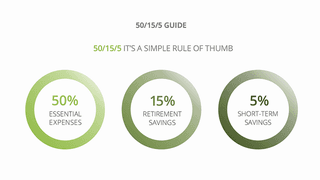Start Your Journey
- Save up an emergency fund equal to at least three months of your living expenses.
- Create a debt repayment schedule that pays down your debt at a minimum cost of interest and maximum benefit in profit to you. Compare the interest on your debt with the return on investment you are getting per dollar for the month.
- Open up a retirement account.
- Consider investing in the likes of mutual and index funds because they are low-risk.
- Consider investing in the individual stocks of companies you feel a strong affinity for (only if you feel confident of your investing savviness).
194
1.8K reads
CURATED FROM
IDEAS CURATED BY
A junior reader who enjoy topics that advocate for self-improvement. Also a proponent of healthy living and mindfulness (still learning). Let’s connect and explore the world of books together!
Having a written financial plan gives us a measurable goal to work toward. We can reduce doubt or uncertainty about our decisions and adjust to help overcome obstacles that could derail us.
“
The idea is part of this collection:
Learn more about habits with this collection
How to build confidence
How to connect with people on a deeper level
How to create a positive first impression
Related collections
Similar ideas to Start Your Journey
Focus on...
- Building an emergency fund: set up an automatic weekly or monthly transfer from your checking account to your savings, then leave the savings alone until an emergency appears.
- Eliminating high-interest debt: Set up a simple debt repayment plan by organizing your debts b...
20%: Savings
Finally, try to allocate 20% of your net income to savings and investments. This includes adding money to an emergency fund in a bank savings account, making IRA contributions to a
The 50/15/5 rule for multiple financial goals
- 50% of your income goes toward essential expenses: rent, bills, minimum debt payments.
- 15% percent goes to retirement savings. They also suggest you increase this by 1% each year.
- 5% goes toward unexpected monthly expenses or building an emergency...
Read & Learn
20x Faster
without
deepstash
with
deepstash
with
deepstash
Personalized microlearning
—
100+ Learning Journeys
—
Access to 200,000+ ideas
—
Access to the mobile app
—
Unlimited idea saving
—
—
Unlimited history
—
—
Unlimited listening to ideas
—
—
Downloading & offline access
—
—
Supercharge your mind with one idea per day
Enter your email and spend 1 minute every day to learn something new.
I agree to receive email updates


